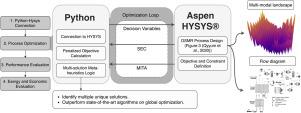Beyond a single solution: Liquefied natural gas process optimization using niching-enhanced meta-heuristics
IF 8
2区 计算机科学
Q1 AUTOMATION & CONTROL SYSTEMS
Engineering Applications of Artificial Intelligence
Pub Date : 2025-06-18
DOI:10.1016/j.engappai.2025.111119
引用次数: 0
Abstract
The escalating global energy demand and the imperative to mitigate climate change necessitate optimizing the natural gas liquefaction process to enhance energy efficiency, reduce costs, and improve sustainability. Traditional approaches typically focus on identifying a single high-quality solution. However, such methods often overlook other potential solutions that are equally good or comparable to the global optimum. These solutions provide alternative, economically viable options for engineers, enabling more insightful decisions. Motivated by this research gap, we propose the application of multi-solution meta-heuristics for the dual-effect single-mixed-refrigerant (DSMR) process, a novel approach in the field of liquefied natural gas (LNG) process optimization. To comprehensively evaluate algorithm performance, we introduce a Quantity-Quality comparative evaluation method, which ranks algorithms based on both the number and quality of solutions identified without requiring prior knowledge of the global optimum. We highlight the effectiveness of multi-solution meta-heuristics in identifying multiple feasible high-quality solutions outperforming commonly used single-solution approaches. Our assessment encompasses exergy efficiency and economic viability, with results showing that 15 out of 17 multi-solution variants surpass the popular genetic algorithm (GA) in global optimization, achieving up to 3% reduction in energy consumption compared to the state-of-the-art solution. Additionally, all niching-enhanced meta-heuristics consistently identified more high-quality solutions than single-solution meta-heuristics. An exergo-economic analysis of the top 15 solutions revealed exergy efficiency improvement of up to 37.73%, with capital cost reductions ranging from 0.27% to 5.22%, and operating cost reductions from 0.24% to 3.1%, compared to the base case. The code is available on GitHub.

超越单一解决方案:使用小生境增强元启发式的液化天然气工艺优化
不断增长的全球能源需求和减缓气候变化的迫切需要优化天然气液化过程,以提高能源效率、降低成本和提高可持续性。传统方法通常侧重于识别单个高质量的解决方案。然而,这种方法往往忽略了其他可能的解决方案,这些解决方案同样好或可与全局最优相媲美。这些解决方案为工程师提供了经济可行的替代方案,使他们能够做出更有见地的决策。基于这一研究空白,我们提出了将多解元启发式方法应用于双效单混合制冷剂(DSMR)工艺,这是液化天然气(LNG)工艺优化领域的一种新方法。为了全面评估算法的性能,我们引入了一种数量-质量比较评价方法,该方法根据识别的解的数量和质量对算法进行排名,而不需要事先知道全局最优解。我们强调了多解元启发式在识别多个可行的高质量解决方案方面的有效性,优于常用的单解方法。我们的评估包括能源效率和经济可行性,结果显示,17个多解决方案变体中有15个在全局优化方面超过了流行的遗传算法(GA),与最先进的解决方案相比,能耗降低了3%。此外,所有小生境增强的元启发式方法都比单一解决方案的元启发式方法一致地识别出更高质量的解决方案。一项对前15种方案的火用经济分析显示,与基本情况相比,火用效率提高了37.73%,资本成本降低了0.27%至5.22%,运营成本降低了0.24%至3.1%。代码可在GitHub上获得。
本文章由计算机程序翻译,如有差异,请以英文原文为准。
求助全文
约1分钟内获得全文
求助全文
来源期刊

Engineering Applications of Artificial Intelligence
工程技术-工程:电子与电气
CiteScore
9.60
自引率
10.00%
发文量
505
审稿时长
68 days
期刊介绍:
Artificial Intelligence (AI) is pivotal in driving the fourth industrial revolution, witnessing remarkable advancements across various machine learning methodologies. AI techniques have become indispensable tools for practicing engineers, enabling them to tackle previously insurmountable challenges. Engineering Applications of Artificial Intelligence serves as a global platform for the swift dissemination of research elucidating the practical application of AI methods across all engineering disciplines. Submitted papers are expected to present novel aspects of AI utilized in real-world engineering applications, validated using publicly available datasets to ensure the replicability of research outcomes. Join us in exploring the transformative potential of AI in engineering.
 求助内容:
求助内容: 应助结果提醒方式:
应助结果提醒方式:


